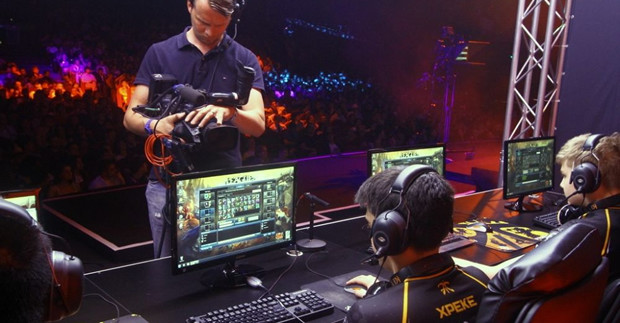Professional gaming or competitive gaming or eSports as some call it, is officially a sport since 2013. In fact the video gamers who are taking part in the million dollar gaming competitions can travel as “athletes” to U.S.A, which is undeniably the heartland of gaming industry. Although U.S. State department recognizes competitive gaming as a sports, the rest of the world may have some catching up to do. Gaming is not only evolving in the technology but also in skill and scale. As more immersive gaming is constantly invented in the form of V.R. and motion gaming, video games are going to become a major spectator sport just like swimming and gymnastics.  Well, not quite like those sports. It is interesting to note that most of the athletic tournaments host a dozen sporting events of which most go unattended by a majority of spectators. Other than top of the line sporting events like soccer, cricket, baseball, rugby, basketball and hockey there are few sports that attract large crowds. Even Olympic events are often marred by lack of ticket sales and low turnouts. Whereas eSports events are being streamed live to a large audience online. There is a huge internet fanbase of professional gamers. Gaming has found its niche on YouTube in this decade. In fact gaming is so big on YouTube that almost every YouTuber has a gaming/review channel now. Check this out for a list of top gaming channels on YouTube.
Well, not quite like those sports. It is interesting to note that most of the athletic tournaments host a dozen sporting events of which most go unattended by a majority of spectators. Other than top of the line sporting events like soccer, cricket, baseball, rugby, basketball and hockey there are few sports that attract large crowds. Even Olympic events are often marred by lack of ticket sales and low turnouts. Whereas eSports events are being streamed live to a large audience online. There is a huge internet fanbase of professional gamers. Gaming has found its niche on YouTube in this decade. In fact gaming is so big on YouTube that almost every YouTuber has a gaming/review channel now. Check this out for a list of top gaming channels on YouTube.
The evolving interest in video games has also led to the change in the way games are marketed and packaged these days. Earlier game developers used to sell games as a single monolithic product with the hopes that its popularity would drive the demand for a sequel. Now a days games are designed as a continued engagement and the gameplay has become more complex and layered. Crowdfunding and micro-payment methods have become key aspects of game sales. We are looking at a wider involvement of people in gaming too. The age group that is typically associated with gaming is growing. Now it is not just the teenagers or young male who are investing in gaming consoles and game DVDs.

Competitive gaming is a rage across countries like the U.S.A, Japan and Korea. European countries have an emerging gaming culture and large events are becoming common. Other Asian nations are coming up with their gaming conventions and competitions. You can watch this documentary from Valve about the industry of competitive gaming:
Organizing a competitive gaming event takes a lot of hardware, software, networking and co-ordination. At Shockfruit we are developing a platform for gaming event organizers to find resources and consolidate their efforts. Professional gamers should join the site to be able to connect with events, sponsors and fellow gamers.
